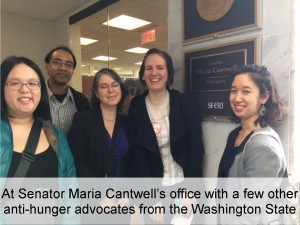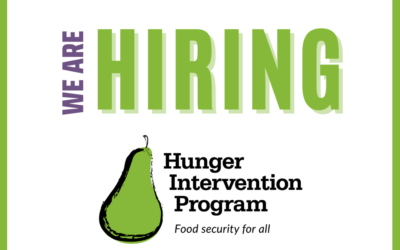I was comfortably sitting at the window seat on my long flight back from Washington DC to Seattle. I just wanted to close my eyes and take some rest after three intense days at the National Anti-Hunger Policy Conference. But my mind was racing with millions of thoughts, trying to rearrange everything I learned in the last three days. As it always happens, there were more questions than answers. But there was one thing that I knew for sure. I was coming back with a renewed sense of importance and urgency about the work we do at Hunger Intervention Program (HIP).
E very year Food Research and Action Center (FRAC) and Feeding America organize a National Anti-Hunger Policy Conference in Washington DC that brings thousands of anti-hunger advocates from all across the country. This year, HIP received a scholarship to attend the conference. I took that opportunity and spent three days in the other Washington learning about anti-hunger policies, connecting with advocates from around the country, and meeting with our state senators and representatives to make sure they understand the impact federal policies have on millions of Americans every day. There were many takeaways for me from the conference. Here are top five of them.
very year Food Research and Action Center (FRAC) and Feeding America organize a National Anti-Hunger Policy Conference in Washington DC that brings thousands of anti-hunger advocates from all across the country. This year, HIP received a scholarship to attend the conference. I took that opportunity and spent three days in the other Washington learning about anti-hunger policies, connecting with advocates from around the country, and meeting with our state senators and representatives to make sure they understand the impact federal policies have on millions of Americans every day. There were many takeaways for me from the conference. Here are top five of them.
- Supplemental Nutrition Assistance Program (SNAP), which is more commonly known as food stamps, works! There is strong data to support that the program has helped millions of hardworking families lift themselves out of poverty. Nation wide, Feeding America, nation’s largest domestic hunger-relief organization, provides four billion meals a year. That is huge. Yet, that pales in comparison to the support that SNAP provides to millions of people every day who would otherwise go hungry. Private charities cannot, and should not, replace government safety nets. SNAP is designed to be responsive to the economic conditions. When the great recession hit in 2008, more people were covered by SNAP. As the economy recovered, SNAP enrollment also reduced. This program doesn’t need dismantling. Rather it needs to be strengthened and expanded to make sure no one is falling through the cracks and the benefits are adequate to meet the needs of the families it supports.
- We eat food, and we also live in a home, raise family, work at a job, access healthcare, play sports, visit parks, so on and so forth. As renowned writer and activist Audre Lorde said, “there is no thing as a single-issue struggle because we do not live single-issue lives”. This was a repeated theme that I heard at the conference at almost every session. While we are primarily anti-hunger advocates, we also need to remember that food policy can’t be isolated from other safety net policies or the broader economic issues. For example, many people are just one health crisis away from falling into joblessness, poverty, and hunger. We cannot end hunger without strong safety net programs, equitable economic policies, rights for the oppressed including people with disability, LGBTQ population, immigrants, refugees, and other minorities.
- With the recent crackdown on immigration and wave of deportations, many food organizations across the country are really worried about immigrant and refugee populations accessing their services. I heard many of them worrying about the safety of people accessing their services. Are immigrants and refugees more vulnerable to being deported if they show up at a food bank? Many organizations reported that an abundance of their clients are living in fear — parents are not sending their children to school, people are not showing up to use their food benefits even when they are eligible, and people are not accessing health care unless it is a dire emergency. We don’t want anyone to go hungry and at the same time, don’t want anyone to be vulnerable to be deported just because of accessing our services. This is a delicate balance and with the situation being so volatile, there are no clear answers at this point. We just have to keep doing our work as best as we possibly can.
- Advocacy works! When people show up in numbers and make calls on a particular issue, legislators take note of that. They like to know real stories from the ground. On the last day of the conference I visited the offices of our state senators and representatives, along with the rest of the delegation from Washington state, running from building to building to be on time for our appointments. Some of them were sympathetic to our cause and some were not so much. But everyone listened to our concerns and demands. There was no doubt that people who are directly affected by an issue have the power when they are given a voice. If we fail to stand up for our rights, we lose them.
- As bad as the current situation is for people defending basic human services and human rights, throughout the conference there was also this sense of optimism grounded in the strength our work. I heard how people were taking inspiration from the recent surge of citizen involvement. FRAC staff reminded us that we have been through worse times in the past when our safety net programs were under the threat of being dismantled. In the words of Dr. Martin Luther King Jr, “the arc of the moral universe is long, but it bends towards justice.” We can and we will be able to protect basic human rights if we organize together for a better future. As one of the keynote speakers at the conference said, “only organized people can fight organized money”. There are reasons to be hopeful and one of them is you.
During the conference, as I was running from one session to the next through a maze of hallways at the convention center, I was drawing inspiration from more than 1300 attendees at the conference. The passion to protect our most cherished values is palpable when you are in a room full of dedicated anti-hunger advocates. I know we have a lot of work ahead of us. I know our work won’t be easy. Yet, I also came back with this renewed sense of purpose and conviction that we will be able to protect our hard fought wins over the years. In fact, we don’t have the option not to. People’s lives literally depend on these policies.




0 Comments